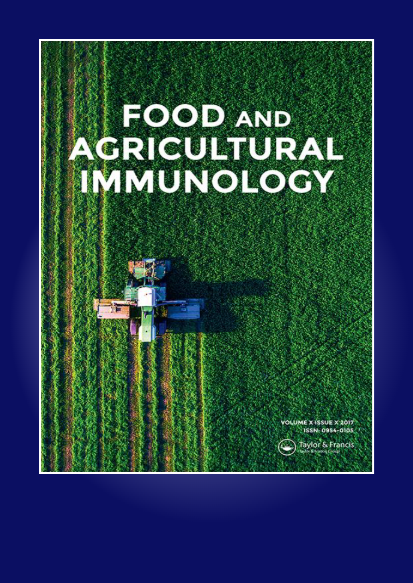Environmental carbon tetrachloride exposure disrupts the liver structure and metabolic detoxification function in mice via p38MAPK/NF-κB/NLRP3 pathway
IF 2.1
3区 农林科学
Q3 CHEMISTRY, APPLIED
引用次数: 0
Abstract
ABSTRACT We investigated the effects of carbon tetrachloride (CCl4) exposure on liver detoxification. We confirmed that 0.2%-0.8% CCl4 decreased the liver carboxylesterase (CarE), lactate dehydrogenase (LDH) activity and total protein (TP) levels, while 0.2% and 0.8% CCl4 increased the liver acetylcholine esterase (AChE) activity (P< 0.05). It was observed0.4%-0.8% CCl4 increased serum glutathione S-transferase (GST) and catalase (CAT) activity, 0.1%-0.8% CCl4 increased the level of malondialdehyde (MDA), and 0.2% CCl4 increased the level of total superoxide dismutase (T-SOD). The expression of nod-like receptor protein 3 (NLRP3), interleukin-1β (IL-1β), and tumour necrosis factor-α (TNF-α) were significantly elevated in 0.2%-0.8% CCl4 exposure (P< 0.05). The expression of p38MAPK, gasdermin D (GSDMD), and nuclear factor kappa-B kinase (IKK) was decreased in 0.1%-0.8% CCl4 exposure, while the apoptosis was not statistically different in all groups. This indicates that 0.1% CCl4 exposure could damage the liver structure and detoxification function via p38MAPK/NF-κB/NLRP3 pathway. GRAPHICAL ABSTRACT环境四氯化碳暴露通过p38MAPK/NF-κB/NLRP3途径破坏小鼠肝脏结构和代谢解毒功能
摘要:我们研究了四氯化碳(CCl4)暴露对肝脏解毒的影响。结果表明,0.2% ~ 0.8% CCl4降低了肝脏羧酸酯酶(CarE)、乳酸脱氢酶(LDH)活性和总蛋白(TP)水平,0.2%和0.8% CCl4提高了肝脏乙酰胆碱酯酶(AChE)活性(P< 0.05)。0.4% ~ 0.8% CCl4可提高血清谷胱甘肽s转移酶(GST)和过氧化氢酶(CAT)活性,0.1% ~ 0.8% CCl4可提高丙二醛(MDA)水平,0.2% CCl4可提高总超氧化物歧化酶(T-SOD)水平。暴露于0.2% ~ 0.8% CCl4时,淋巴结样受体蛋白3 (NLRP3)、白细胞介素-1β (IL-1β)、肿瘤坏死因子-α (TNF-α)的表达显著升高(P< 0.05)。在0.1% ~ 0.8% CCl4暴露时,p38MAPK、气皮蛋白D (GSDMD)和核因子κ b激酶(IKK)的表达降低,而凋亡在各组间无统计学差异。这表明0.1%的CCl4暴露可通过p38MAPK/NF-κB/NLRP3通路破坏肝脏结构和解毒功能。图形抽象
本文章由计算机程序翻译,如有差异,请以英文原文为准。
求助全文
约1分钟内获得全文
求助全文
来源期刊

Food and Agricultural Immunology
农林科学-毒理学
CiteScore
5.30
自引率
6.70%
发文量
52
审稿时长
2 months
期刊介绍:
Food and Agricultural Immunology is an international open access journal publishing original immunological research with applications in food, agricultural, environmental and veterinary science. Submissions describing the use of immunological techniques and methods are particularly welcomed.
The journal aims to expand our understanding of the interactions at the interface of food and immune systems including studies on:
-Development of diagnostic systems – all types of ligand-based assays, e.g. antibody, aptamer
-Application of ligand-based assays for the detection or identification of molecules of interest in food science, agricultural research, veterinary investigations and clinical systems relating to food allergy or sensitivity to agricultural chemicals
-Effects of food on the immune system
-Studies on allergy and allergic reactions
-Investigations into food allergies
-Development of allergen-free food systems
-Development of novel assay formats
-Applications of assay systems to the monitoring of food items in relation to safety and labelling
-Food quality issues, e.g. speciation, adulteration and contamination
-Comparisons between different analytical techniques
The journal publishes research and review articles and is essential reading for food scientists, immunologists and all those concerned with the interaction between food and immune systems.
 求助内容:
求助内容: 应助结果提醒方式:
应助结果提醒方式:


